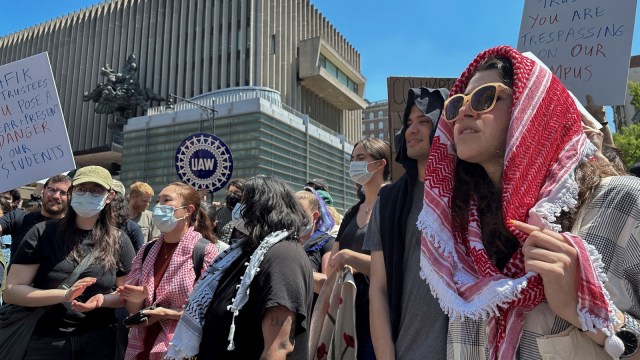
Zadie Smith is a little confused in her latest essay, ‘Shibboleth’, out in The New Yorker this weekend, arguing that language and rhetoric must be used carefully when protesting Israel’s actions in Gaza. The piece reminds me of Margaret Atwood’s oft-quoted rebuttal to cancel culture, “If you’re speaking truth to power, make sure it’s the truth”, or, less charitably, the hundreds of words spoken at White House press briefings when humanitarian aid in Gaza is discussed without mentioning Israel.
The essay raises some decent points about protest rhetoric. She asks protestors to be considerate of the Jewish student who walks past an encampment on the Columbia campus, is called a Zionist, and then asked to stay away. She needles into the student activist’s insecurity of having to say what everyone else is saying, fast, to avoid ostracisation and accusations of ignorance/inaction. She even calls out Israel-sympathisers and their use of terms like “surgical strikes” and “controlled military operations” when the bombs’ drop zones have been anything but. She harkens to the anti-Vietnam War protests on the same campus and salutes the students’ willingness to “place their body between the enemy’s gears” in both instances.
But that’s about it. The piece’s timing, the recent reportage of its publisher, the ideas discussed, and the author’s ignorance of her own privilege and influence make it sound needlessly contrarian and out-of-touch.
What’s wrong with the timing and publisher? The New Yorker rubs shoulders with The New York Times, both panned widely for using the passive voice in headlines about Palestinian deaths and starvation, instead of an active voice that would clearly assign blame to Israel. ‘Gaza Is Starving’, read the headline of a New Yorker piece in January; how about “Israel is starving Gaza”? Smith doesn’t mention the latest US funding of Israeli artillery only two weeks ago, to the tune of $17.28 billion, or the Columbia president’s statements to the US Congress about “failing to protect Jewish students” on campus without a word of support for the protests themselves.
Then there’s what she does mention. Smith opens her piece with a semantic discussion about how “a politics unmoored… from ethical philosophy” is dangerous. Then, in over 200 words, she narrates how she refused to commit an arrestable offence during a climate protest years ago because it would make travel to the United States difficult: “I could not give up my relationship with New York City for the future of the planet.” Then she raps old people for dismissing student activism. Then she (falsely) argues that pro-ceasefire activists don’t care about Hamas’s hostages (ironically, using the passive voice: “There is a dangerous rigidity… in the idea that concern for the dreadful situation of the hostages is somehow in opposition to… the demand for a ceasefire.” Who’s saying this, exactly? One Twitter activist?) Then she conflates the slogan “From the River to the Sea” with one calling for Gaza’s Jewish residents to “vanish”. Finally, she spends 500 words saying that words like “Hamas” and “Zionist” have “unbelievably labyrinthine histories”.
Her own best counter-argument for this: “The objection may be raised… that I am behaving like a novelist… making some rarefied point about language and rhetoric while people commit bloody murder. This would normally be my own view, but, in the case of Israel/Palestine, language and rhetoric are and always have been weapons of mass destruction.”
True, they have been. But by choosing to write this essay as a world-famous writer in a world-famous publication, Smith ignores her own privilege and considerable influence. She speaks, almost solely, to the most ill-informed parts of a protesting crowd, forgetting that her position has already been advocated for in mainstream media, college campuses and history books. She spends 2,300-odd words arguing for nuance and then dismisses them all by calling her essay “a little stream of words” that “have no more weight than an ear of corn”. If so, should this space not have gone to activists and journalists closer to the movement, like journalist Motaz Azaiza or comedian Bassem Youssef? Why pretend your views exist in a media vacuum that does not displace others’ and take up real estate on social media feeds and is distributed to doorsteps worldwide?
I understand the need for nuance. It is the fiction writer’s bread-and-butter, the tactic by which the form is distinguished from journalism by accessing a space of amorality, ambiguity and contradicting ideologies. But a fiction writer is also a citizen. In India, that’s the role novelist Arundhati Roy has often assumed in her political essays, facing both bouquets and brickbats. Even when you doubt her politics, you don’t doubt her conviction. But Smith’s essay? You just wonder why it was written.
udbhav.seth@expressindia.com


